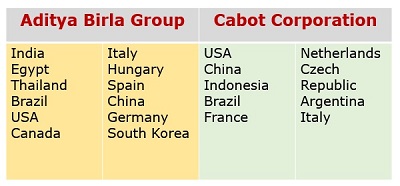Carbon black is mainly used as a rubber-reinforcing agent and performance additive in diverse applications in rubber products (e.g. tires, hoses, belts, etc.), coatings, printing inks, extruded profiles, moulded goods and polymer systems.
The diversity of carbon black uses dictates the necessity to fine-tune its specifications and develop new product grades in the way that, for instance, US company Sid Richardson Carbon & Energy Co. does, producing carbon black in varying aggregate sizes and structures for a roster of application challenges.
Nowadays, such versatility is an optimal strategy, which allows quickly and flexibly adapt to the fluctuations in demand, macroeconomic situation, and other factors.
Another viable strategy of diversification has a regional or more precisely multinational dimension, when major carbon black producers establish production facilities in different countries and regions. Leading manufacturers of this chemical, like Aditya Birla Group or Cabot Corporation, produce carbon black throughout the world on a truly global basis.
Locations of carbon black manufacturing facilities of Aditya Birla Group and Cabot Corporation

Globalization is risky and not without faults for various reasons, but the benefits of such policy are unquestionable. However, predominantly regional players, like Jiangxi Black Cat Carbon Black Co, also operate on the carbon black market, though this company has been also expanding to other countries, including India, Taiwan and the USA.
Another potent strategy to combat current market turbulence could be the efforts to strengthen product’s conformity with existing regulation, safety protocols and standards. To this extent, the move to complete carbon black registration for the EU chemicals industry regulation known as REACH was a very healthy decision. It was undertaken a few years ago by a seven-company consortium, comprising Evonik Degussa, Cabot Corp., Columbian Chemicals Co., Timcal Belgium SA, Sid Richardson Carbon & Energy Co., Continental Carbon Co., and Cancarb Ltd.
More reliable information on the carbon black market can be found in the topical research study “Carbon Black (BC): 2017 World Market Outlook and Forecast up to 2021”.
